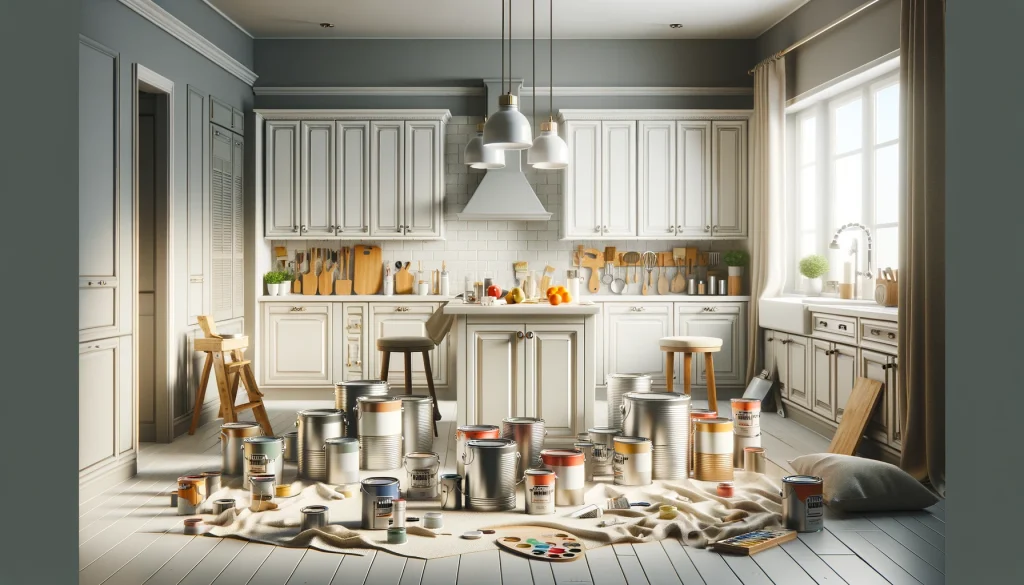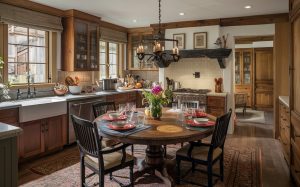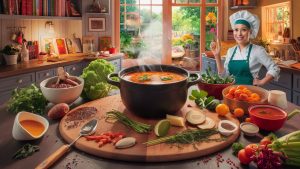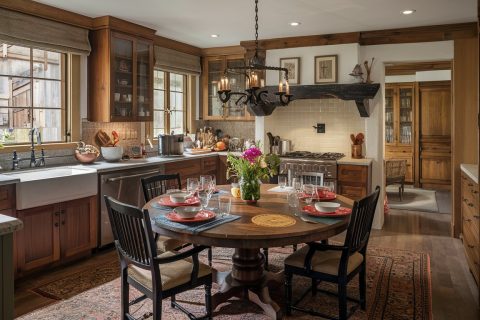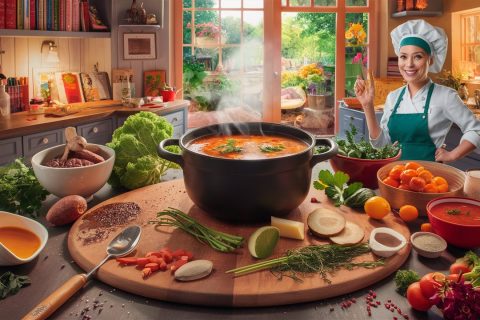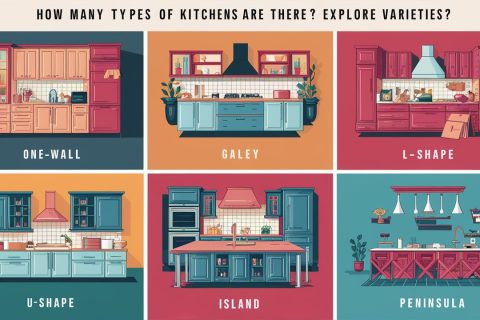Acrylic enamel paint is highly regarded for kitchen cabinets due to its durability and smooth finish. For a professional appearance, consider using oil-based or waterborne alkyd paint.
Selecting the right paint for kitchen cabinets ensures longevity and ease of maintenance. Kitchens experience fluctuating temperatures, humidity, and frequent touches, so choosing a paint that can withstand these conditions is crucial. Acrylic enamel offers a hard, durable surface that resists stains and wipes clean effortlessly.
Oil-based paints are known for their superior smoothness and durability, but they require longer drying times and can yellow over time. Waterborne alkyds present a middle-ground with the durability of oil-based paints, but with easier cleanup and faster drying times, like traditional acrylics. The ideal paint will balance durability with aesthetic finish, providing a fresh look that can endure the hustle and bustle of a busy kitchen.
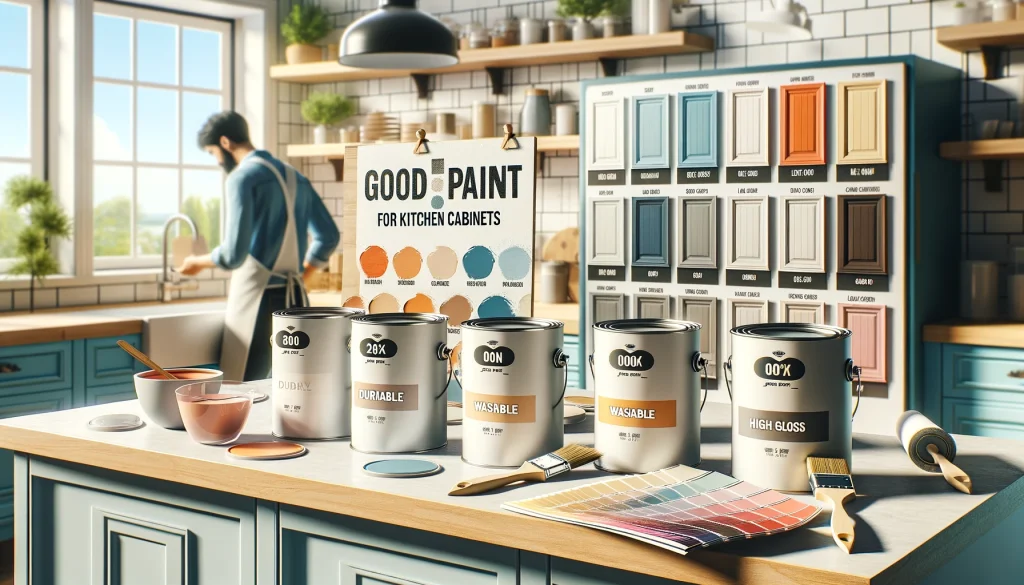
Introduction To Kitchen Cabinet Makeovers
Refreshing your kitchen cabinets can transform your cooking space. It’s cost-effective and gives the heart of your home a new lease on life. A fresh coat of paint on cabinets does more than change a color scheme. It revitalizes your kitchen without the expense of a full renovation. With the right paint, those cabinets will go from dull to dazzling with just a few strokes of a brush.
The Importance Of Choosing The Right Paint
Picking the correct paint for kitchen cabinets is crucial. The kitchen faces heat, grease, and moisture daily. Durable paint withstands these conditions. It also makes cleaning easier. Quality paint looks better and lasts longer. This upgrades your kitchen’s feel for years to come.
Factors To Consider Before Repainting Cabinets
- Cabinet material: Wood, laminate, and metal need different paints.
- Finish: Gloss, semi-gloss, or satin affects cleaning and look.
- Color: Light colors open up spaces, while dark tones create warmth.
- Primer: A good primer ensures better adhesion and finish.
- Application process: Brushes, rollers, or sprayers impact the outcome.
- Cure time: Quick-drying paint gets your kitchen back in action sooner.
- Eco-friendly options: Low VOC paints protect indoor air quality.
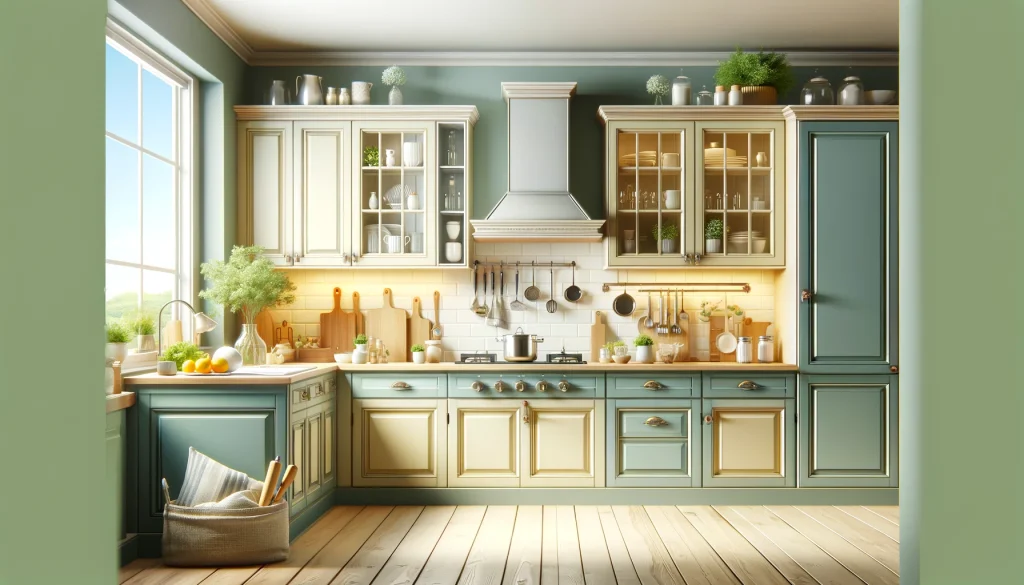
Types Of Paint Suitable For Kitchen Cabinets
Kitchen cabinets need a paint that not only looks good but also withstands the test of time. Cabinets endure frequent cleaning, touching, and exposure to heat, humidity, and cooking residues. Selecting the right type of paint is pivotal to ensure your cabinets look pristine for years. Let’s delve into the specifics.
Oil-based Vs. Water-based Paints
When considering durability and finish quality, oil-based paints top the list. Their robust formulation tends to create a hard, protective layer that’s less prone to chipping. However, cleanup requires solvents, and drying times are longer.
- Pros of Oil-Based Paints:
- Durable finish
- Smooth application
- Cons of Oil-Based Paints:
- Longer drying times
- Cleanup requires solvents
Water-based paints, also known as latex paints, offer a quicker drying time and an easy water cleanup. With improvement in formula technology, some water-based paints now rival the durability of oil-based options.
- Pros of Water-Based Paints:
- Quick drying
- Easy cleanup
- Cons of Water-Based Paints:
- May not be as durable as oil-based paints
The Role Of Acrylic And Latex In Cabinet Coatings
Acrylic and latex paints are subsets of water-based paints, with acrylic being noted for its durability and elasticity. This elasticity helps in resisting cracking and peeling off. Latex paints have evolved significantly and can offer great coverage and resistance to moisture.
| Paint Type | Benefits | Considerations |
|---|---|---|
| Acrylic | Resilient, flexible finish | Can be more expensive |
| Latex | Great coverage, moisture resistant | Not as tough as oil-based paints |
Both acrylic and latex paints come in a variety of finishes, from matte to high-gloss, allowing for customization based on your kitchen’s aesthetic and the level of sheen you desire.
Bold in drying time and ease, water-based acrylic and latex paints are growing in popularity. Coupled with advancements in formulations, they are now contenders in the kitchen cabinet paint arena.
Top Picks For Kitchen Cabinet Paints
Refurbishing your kitchen starts with the right paint for your cabinets. The best paints add a fresh, durable finish. Let’s delve into top recommendations that ensure your cabinets boast both style and longevity.
Premium Options For Durability And Finish
For those seeking exceptional quality, premium paints offer the best in durability and finish. High-end options promise a lasting makeover for your kitchen cabinetry.
- Alkyd Enamel Paint: Mimics oil-based paint’s smoothness with easier cleanup.
- 100% Acrylic Paint: Provides a tough, chip-resistant layer.
- Urethane-Modified Acrylic Paint: Combines flexibility with a tough, non-yellowing finish.
These top-tier products ensure a robust, professional appearance. They withstand daily use and frequent cleaning, ideal for busy kitchens.
| Product Type | Features | Best For |
|---|---|---|
| Alkyd Enamel Paint | Oil-like finish, water cleanup | Smooth surfaces |
| 100% Acrylic Paint | Chip-resistant, durable | High-traffic cabinets |
| Urethane-Modified Acrylic | Flexible, non-yellowing | Longevity in finish |
Cost-effective Choices For Budget-conscious Homeowners
Affordable options can still offer quality results. These budget-friendly choices keep your kitchen renovation cost-effective without compromising on appearance.
- Latex Paint: Easy to work with and quick to dry.
- Chalk Paint: Requires minimal prep work for a matte finish.
- Milk Paint: An eco-friendly choice with a unique finish.
Each provides a distinct aesthetic while staying wallet-friendly. They allow for creative expression in color and texture.
- Latex paint is great for a quick update.
- Chalk paint suits a vintage look.
- Milk paint works for an antique feel.
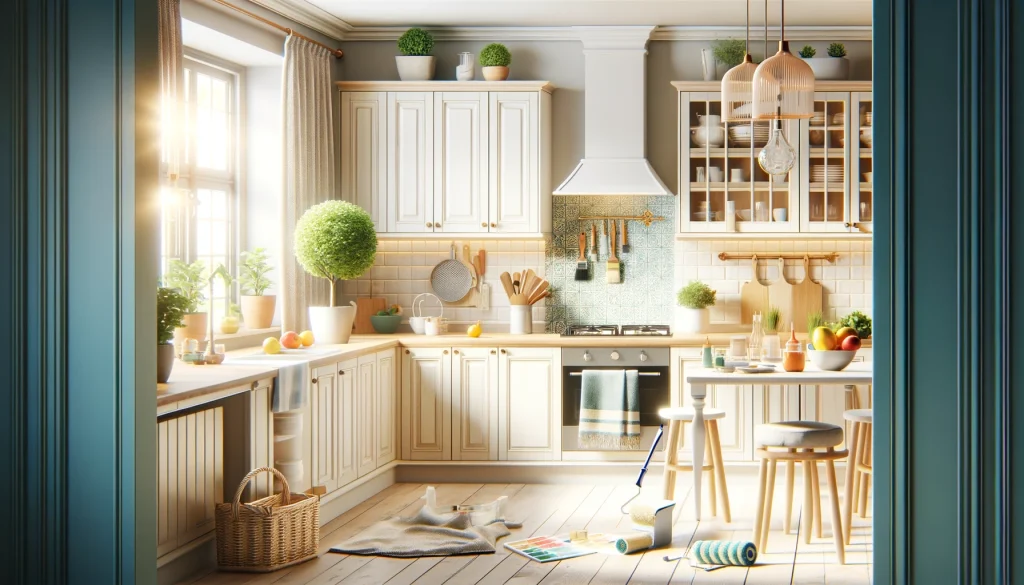
Preparation Steps Before Painting
Embarking on a journey to refresh your kitchen cabinets with a splash of paint? It’s essential to follow the right preparation steps. Proper preparation ensures that your paint adheres well and lasts longer. Ignoring these steps could result in a less durable finish. So, let’s dive into the preparatory phase vital for a beautiful, long-lasting outcome.
Cleaning And Sanding The Surfaces
Clean cabinets are crucial for the paint to stick. Start by wiping down your cabinets with a degreasing cleaner. This removes cooking residue and grease. After cleaning, it’s sanding time. Sanding helps to smooth out imperfections and provides a better surface for the paint to adhere. Use a medium-grit sandpaper, and remember to wipe down the dust afterward.
- Remove all hardware and clean thoroughly.
- Sand with medium-grit sandpaper for even surfaces.
- Wipe down the dust with a tack cloth.
Applying Primer: Is It Necessary?
Wondering about primer? Yes, it’s a must for a smooth, even base. Primer helps in hiding any stains or wood knots and ensures the paint color really pops. For kitchen cabinets, a stain-blocking primer is best. This will prevent any potential stains from seeping through the paint. Let the primer dry as per the instructions before moving on to painting.
- Choose a high-quality stain-blocking primer.
- Apply primer evenly and let it dry completely.
- Lightly sand the primed surface for ultimate smoothness.
Application Techniques For A Flawless Finish
Applying paint to kitchen cabinets can utterly transform your space. But it’s crucial to use the right technique for a flawless finish. Choosing the correct tool and method plays a pivotal role in achieving that smooth, professional look. Let’s explore the best application techniques that ensure your cabinets look their absolute best.
Brushes Vs. Rollers Vs. Spray Guns
When it comes to painting cabinets, you have three main tools: brushes, rollers, and spray guns. Each has its own advantages. Brushes offer precise control around edges. Rollers can cover large, flat areas quickly. Spray guns provide a superior smooth finish but require more setup and practice to master.
Tips For Avoiding Streaks And Brush Marks
- Choose the right paint: Use self-leveling, high-quality acrylic latex paints.
- Prep thoroughly: Clean and sand the cabinets before you begin.
- Test first: Practice your technique on a scrap piece of wood.
- Work in sections: Finish one area before moving on to the next.
- Maintain a wet edge: This prevents lines from forming as paint dries.
- Use extenders: Add a paint conditioner to slow drying time and reduce brush marks.
Curing And Drying Time Considerations
When painting kitchen cabinets, it’s critical to consider how long the paint takes to dry and cure. These times can impact the project’s timeline and the durability of the finish. Let’s explore the essential details about drying and curing times when choosing a good paint for kitchen cabinets.
Understanding Paint Drying And Curing Processes
Drying and curing are not the same. Drying refers to when the paint feels dry to touch. Curing means the paint has reached its maximum hardness and durability. This knowledge helps pick the right paint. Here’s why these times matter:
- Quick drying allows for faster re-coating.
- Full curing ensures a durable and cleanable surface.
Different paints have different timelines:
| Type of Paint | Drying Time | Curing Time |
|---|---|---|
| Latex | 1 hour | 2-4 weeks |
| Oil-Based | 6-8 hours | 7 days |
| Alkyd | 2-3 hours | 3-7 days |
How To Speed Up The Process Safely
To reduce wait times, safety first! Ensure these tips match your chosen paint type. Patience will deliver a smooth, long-lasting finish.
- Ample Ventilation: Speeds drying, reduces fumes.
- Warm Temperatures: Paint dries faster in warm air.
- Avoid Humidity: Dry air promotes quicker curing.
Use fans to circulate air without pointing directly at surfaces. This avoids dust and debris setup in wet paint.
Consider designed to accelerate drying times safely. Always follow the manufacturer’s guidelines to ensure integrity and finish quality.
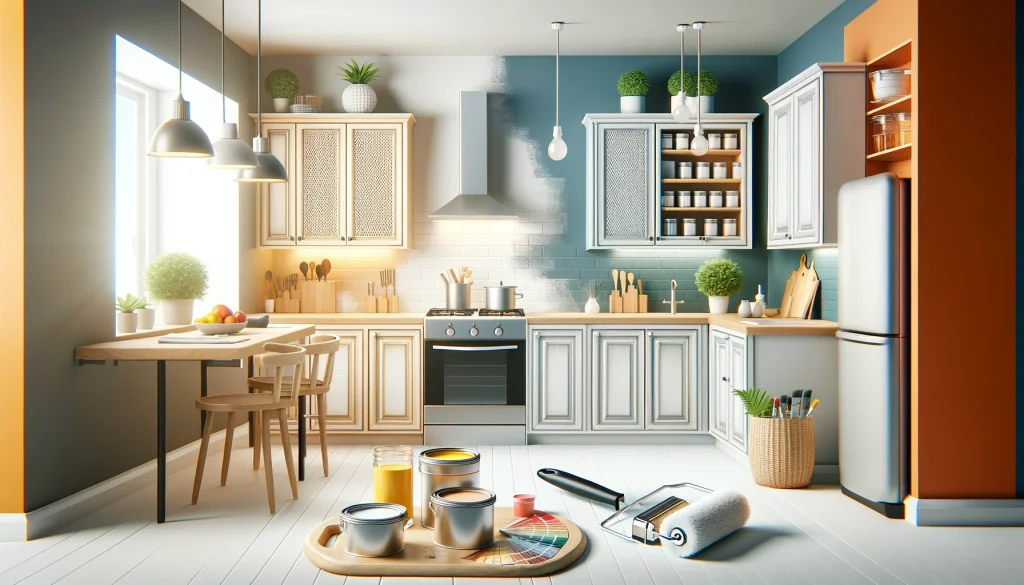
Maintenance And Care For Painted Cabinets
Once your kitchen cabinets are freshly painted, maintaining their appearance becomes crucial. Proper care keeps them looking new and extends their longevity. This section provides tips to preserve the finish on your painted cabinets.
Regular Cleaning Tips
Regular cleaning prevents dirt and grease buildup. Here’s how to keep your painted cabinets spotless:
- Use a soft cloth: A microfiber cloth is gentle on paint.
- Opt for mild soap: Harsh chemicals can damage the paint. Mix warm water with a mild dish soap for a safe cleaning solution.
- Wipe spills immediately: When spills happen, clean them quickly to avoid staining.
- Dry thoroughly: After cleaning, dry with a soft, clean cloth to prevent watermarks.
Dealing With Chips And Scratches
Accidents happen, but you can fix chips and scratches with ease:
- Clean the area: Before any repair, clean the damaged spot with a mild soapy solution.
- Sand lightly: Use fine-grit sandpaper to smooth the edges of the chip or scratch. Be gentle to avoid more damage.
- Apply paint: Use a small artist’s brush to apply matching paint to the area. Do this in thin layers, allowing each to dry before adding another.
- Seal if necessary: Once the paint is dry, seal it with a clear topcoat for protection.
Conclusion: Transform Your Kitchen Cabinet Aesthetics
Breathe new life into your kitchen with a fresh coat of paint on the cabinets. Selecting the right paint can completely transform the heart of your home.
The Impact Of A Quality Paint Job
A top-notch paint job does more than update your cabinet’s look. It protects against humidity and wear. It makes cleaning easier. Choose paints that last long and enhance cabinet durability.
- Glossy finishes repel stains and are simple to wipe clean.
- Semi-gloss offers a balance between sheen and easy cleaning.
- Satin finishes hide imperfections but still resist grease.
Final Thoughts On Cabinet Makeovers
Your kitchen’s look and feel improves with quality paint. An investment in good paint pays off in beauty and longevity. Choose wisely to make your kitchen cabinets stand out.
| Paint Type | Benefits |
|---|---|
| Gloss | High resistance to moisture, easy cleaning |
| Semi-gloss | Good durability, moderate cleaning ease |
| Satin | Low sheen, hides imperfections |
Remember, the right paint can make a huge difference. Invest in a premium product and you’ll enjoy stunning cabinets for years.
Conclusion
Selecting the right paint for your kitchen cabinets ensures longevity and style. Opt for durable, high-gloss finishes that withstand frequent cleaning. Water-based acrylics are a smart, eco-friendly choice. With the right prep and paint, your cabinets will transform your kitchen’s appeal.
Happy painting and enjoy your refreshed space!
Frequently Asked Questions For What Is A Good Paint For Kitchen Cabinets
What Is The Best Type Of Paint For Cabinets?
The best type of paint for kitchen cabinets is a semi-gloss or high-gloss paint. These finishes are durable, easy to clean, and resist moisture well, which is essential for kitchens.
How To Prep Cabinets For Painting?
Prep cabinets for painting by cleaning thoroughly, sanding, applying a good primer, and repairing any imperfections. Ensuring a smooth, clean surface is key for the best paint adhesion and finish.
Is Oil Or Latex Paint Better For Cabinets?
Latex paint is often preferred for cabinets because it’s durable, has a lower VOC content, and dries faster than oil-based paints. However, some professionals still recommend oil-based paint for its hard finish.
Can You Paint Over Cabinets Without Sanding?
Painting cabinets without sanding is possible with special cabinet paints or by using a high-adhesion primer first. However, sanding is recommended for the best, most durable finish.
More blogs like Kitchen Cabinets:
How to Remove Kitchen Cabinets?
How Long Does It Take to Install Kitchen Cabinets?
How Long Does It Take to Paint Kitchen Cabinets?
What Color Should I Paint My Kitchen Cabinets?
How to Make Oak Kitchen Cabinets Look Modern?

